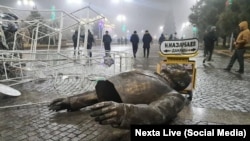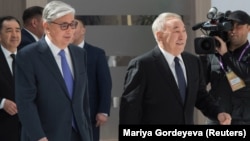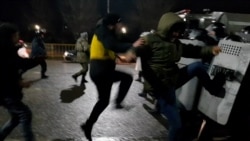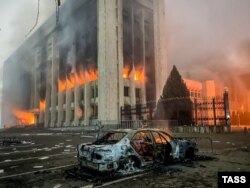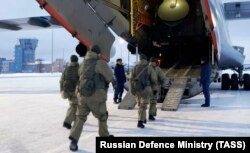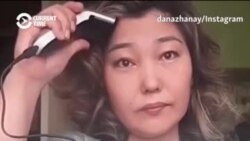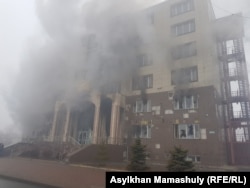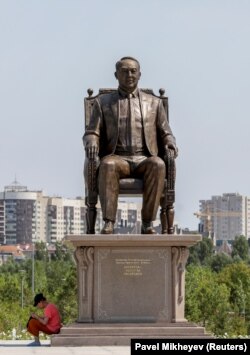International media outlets have identified him as Kazakh protesters’ “main target.” But Kazakh opposition leaders, activists, and political analysts caution against overemphasizing the significance of the January 5 removal of Kazakhstan’s first president, 81-year-old Nursultan Nazarbaev, the official "Leader of the Nation," as chairman of Kazakhstan’s Security Council.
The patronage-based system of governance established by Nazarbaev during his 1990-2019 presidency remains in place, they stress, and its beneficiaries, including Nazarbaev’s political protege, Kazakh President Qasym-Zhomart Toqaev, remain in office.
“Nazarbaev has not left,” commented Mukhtar Ablyazov, a former energy minister and banker, prosecuted by Kazakhstan for alleged money laundering, who heads the banned Democratic Choice of Kazakhstan movement. Only if a “complete change” of the government and state bureaucracy occurs will it be “possible to speak of the fall of the regime or the regime of Nursultan Nazarbaev has changed.”
“The same people are there. Nothing has changed,” said Ablyazov.
Kazakhstan’s demonstrations began peacefully on January 2 in the western Kazakh region of Mangystau after the price of liquefied petroleum gas, used locally for vehicle fuel, roughly doubled to 120 tenge (28 U.S. cents) per liter. Although the government pledged to control those prices, the outcry spread nationwide, with participants demanding the resignation of the government and the removal from influence of Nazarbaev, dubbed the “Old Man.”
On January 5, in Kazakhstan’s commercial capital, Almaty, a city of some 1.8 million, demonstrators stormed the city government headquarters and, allegedly, took control of its airport and vandalized the facility before security forces intervened. Fires were set in Almaty’s city hall, the offices of Nazarbaev’s ruling Nur-Otan (Light of the Fatherland) party, and in a former presidential residence.
Video shot by onlookers and posted on social media on January 5 show groups of male civilians throughout Kazakhstan surrounding uniformed personnel – in one case, in an armored vehicle – and compelling them to give up their posts.
At latest report, the Almaty city commandant's office claims that 12 police officers and National Guard members were killed and 353 personnel injured in the January 5 violence, according to state-run TV channel Khabar 24. The government states that more than 1,000 people overall have been injured, but official statistics for deaths or injuries among civilians have not been released.
President Toqaev has blamed the violence and chaos on foreign-trained “bands of terrorists.” Terming the turmoil “an act of aggression,” Toqaev appealed for help from the Moscow-led Collective Security Treaty Organization (CSTO), a mutual defense bloc with Russia, Armenia, Belarus, Kyrgyzstan, and Tajikistan, “to overcome this terrorist threat.”
He did not substantiate his claims or elaborate about the alleged instigators’ sponsorship.
In a Facebook post, Armenian Prime Minister Nikol Pashinian, who currently chairs the CSTO, stated that the bloc would dispatch peacekeeping troops “for a limited period of time” to encourage stability.
In an interview with Current Time, a former Nazarbaev-era prime minister, Akezhan Kazhegeldin, emphasized, though, that responsibility for such stability lies with President Toqaev.
Public disorder, even when becoming civil war, “is always the responsibility of the authorities, never the responsibility of citizens,” who are “only defending their own rights,” said Kazhegeldin, who served as prime minister from 1994 until 1997. “For this reason, Toqaev should take the first step. He’s the elected president. He should meet with his voters.”
Amidst economic difficulties -- annual per capita Gross Domestic Product stands at barely over $9,000 in this country of roughly 19 million -- anger at the perceived financial perks of proximity to Nazarbaev and other influential figures is genuine, government critics say.
A 2020 RFE/RL investigation found that Nazarbaev's family owns luxury property in six countries valued at nearly $785 million.
Expressing public anger at any such perceived inequities can prove a challenge, critics assert.
As a result, Kazakhstan’s pressure on “civil rights and freedoms, opposition political parties, dissent” means that now “there are no clear-cut leaders” with popular support with whom the government could hold talks to try and calm tensions, commented human rights activist Galyn Ageleyov.
In 2021, the country was ranked as “not free” by the U.S. non-governmental rights monitor Freedom House for both political rights and civil liberties.
The United States, United Nations, and Kremlin also have urged dialogue as well as calm and restraint. U.S. presidential spokeswoman Jen Psaki on January 5 dismissed as “crazy Russian claims” reports that the U.S. government may have somehow instigated the unrest.
But dialogue does not seem on Toqaev's agenda. A national state of emergency has been imposed and the cabinet has resigned. As “counter-terrorism” measures, banks have been closed nationwide. Communication networks remain on the blink.
Airports in Almaty, Aktau, and Aktobe remain closed, and flights from Russia to the capital, Nur-Sultan, have been canceled, according to the Russian news agency Interfax.
But measures affecting Nazarbaev, for decades officially touted as the guarantor of Kazakhstan’s stability, so far appear to have had less immediate impact.
Self-exiled opposition figure Ablyazov downplayed the January 5 toppling of a Nazarbaev statue to the northeast of Almaty, in the regional seat of Taldykorgan, and conjectured that even changing the Nazarbaev-based name of Kazakhstan’s capital, Nur-Sultan, back to Astana would matter little.
Although Toqaev assumed the chairmanship of the Security Council, which defines itself as “a consultative deliberative body” on matters related to national security and defense, a 2018 law installed Nazarbaev in the post for life.
Kyiv-based Kazakh opposition activist Aidos Sadykov agreed with Ablyazov that Nazarbaev’s removal from the Security Council is “a formality” without “significance” intended to show Kazakhs that “Toqaev is ruling the country,” Sadykov said.
Prior to the protests, Toqaev removed Nazarbaev’s nephew, Samat Abish, as deputy head of the country’s security agency.
Risk analyst Dosym Satpaev, though, asserted that Nazarbaev’s ongoing formal control over Nur-Otan carries greater political significance than his chairmanship of the Security Council, which, Satpaev said, has played only a “nominal” role in affairs of state since the former president assumed the chairmanship in 2019.
Public perceptions of his dependence on Nazarbaev have prevented the Kazakh president from acting independently on policy or appointments, he claimed. Kazakhstan’s new acting prime minister, Alikhan Smailov, also is a member of Nur-Otan.
A post “is one thing, but the most important thing is who created this political system, who set up this nomenklatura apparatus, who set up this group of oligarchs who remain to this day [in Kazakhstan],” Satpaev commented. “This is all the first president of Kazakhstan,” whom Kazakhstan’s political and business elite continue to view as the leader, he said.
In late November, Nazarbaev announced that he would transfer his chairmanship of Nur-Otan to Toqaev, but no timeline for such a transition appears to have been announced.
Aside from Security Council chairman, the former Communist Party boss also serves by law as Kazakhstan’s “Elbasy” or “Leader of the Nation.”
On the morning of January 6, amidst “temporary” Internet restrictions, the Elbasy website and the Nazarbaev presidential library’s website had gone offline. President Toqaev’s own website continued to function.
The next steps for Nazarbaev remain unclear.
In Russia, the radio station Ekho Moskvy, majority-owned by state energy company Gazprom, began reporting on January 5 that unidentified sources within the Russian and Kazakh Foreign Ministries allege that Nazarbaev is “ready to leave the country” – “for treatment,” according to the Russian Foreign Ministry source cited by Ekho Moskvy Editor-In-Chief Aleksei Venediktov on Telegram.
Social media reports that Nazarbaev’s family flew out of the country to Kyrgyzstan on January 5 have been debunked by the Kyrgyz site Factcheck.kg and PR staff at the alleged destination airport, Manas.
Nazarbaev does not appear to have commented publicly on his dismissal or reports of his or his family’s departure.
For now, government critics have avoided forecasting what might happen next.
"I think we can't even predict now what will happen tomorrow morning, how the situation will develop," said political activist Dimash Alzhanov, speaking before Toqaev's January 5 appeal to the CSTO. "No one expected that yesterday's mass protest would grow into something bigger. But this happened."
-With additional reporting by Interfax and Reuters




